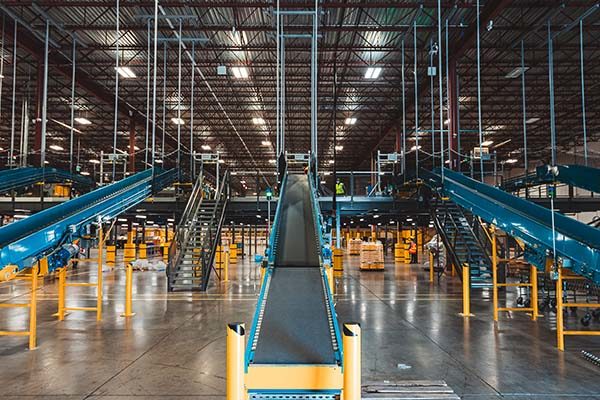Sorting it out with automation
Intelcom’s new high-tech sortation hubs are speeding operations and pushing the Canadian parcel delivery company to new service heights.

Canadian parcel delivery company Intelcom is speeding operations and expanding its services thanks to recent multimillion dollar investments in automated material handling systems at its high-volume sortation hubs across Canada. The investments are fueling Intelcom’s transition from a last-mile delivery specialist to a nationwide parcel company that can handle the middle mile as well, making it a more valuable partner to online merchants who are serving residential customers from British Columbia to the Maritime Provinces and everywhere in between.
“The strategy that we’re putting in place is to build a national network,” says Intelcom President Jean-Sébastien Joly, explaining that the company’s automated hub-and-spoke model allows it to serve a wider audience of e-commerce clients by giving them access to a single point of entry at major logistics hubs in Canada. From those automated hubs, parcels can be sorted and delivered to smaller stations throughout the network for last-mile delivery.
The high-tech transformation is a vital part of Intelcom’s growth strategy.
“We’ve always had hubs, but we were doing manual sortation,” Joly explains, adding that it became clear a few years ago that labor challenges would make it difficult for the company to keep up with its retail clients’ delivery demands. “[We also] felt we needed to increase productivity and decrease transit time.”
Automation is helping Intelcom achieve those goals. With more than 70 locations across Canada, the privately owned, Quebec-based company currently delivers about half a million packages per day to 10 Canadian provinces and two territories for local, national, and international retailers using a network of more than 400 independent delivery partners.
AUTOMATING IN ONTARIO
Intelcom began its automation journey about three years ago, when Joly says company leaders anticipated a labor shortage and started exploring ways to increase productivity across their fulfillment and delivery network. The result was a $12 million investment in a new high-volume sorting hub in Mississauga, Ontario, a major logistics and transportation center. Opened just in time for peak delivery season in the fall of 2021, the hub features two automated systems that can convey and sort 12,000 and 9,000 packages per hour, respectively—more than tripling the number the operation previously handled manually.
The system’s pneumatic conveyors are equipped with “push tray sorters”—high-speed, continuous-loop sortation conveyors that use a bar to physically push parcels off of individual trays. Workers first manually feed parcels onto a flat conveyor, which carries them to a point where they are dropped individually onto the trays of the push tray sorter. The trays then continue the journey, with the bars pushing individual parcels into designated cages along the assembly line. Cages are assigned to either a particular last-mile delivery driver for final delivery or are put on a long-haul route for the middle mile. When full or complete, the cages are manually delivered to the hub’s loading areas and prepped for delivery—with final-mile shipments making their way directly to consumers and middle-mile shipments heading to another station in the network, where they will be sorted for final delivery.
Designed by material handling firm Bastian Solutions, a Toyota Advanced Logistics company, the conveyors operate 24 hours a day, powered by a parcel control platform that is integrated with the facility’s broader IT system—a mix of proprietary software and native embedded solutions. A key part of that system is Intelcom’s proprietary route optimization software, which Joly refers to as “the heart of our technology.” The system creates 4,000 optimized routes across Canada every day, based on the destination of each parcel. A staff of nearly 100 technology experts is working to continuously improve the route optimizer and reduce transit times, according to Joly.
“We own the technology, and we keep building on it,” he explains, emphasizing the company’s commitment to investing in technology across all of its operations as a way to accommodate growth and improve service.
Intelcom’s success in Mississauga has fueled further investment. The company will open a $9 million automated sortation hub in Montreal—featuring the same conveying and sorting technology—by the end of this year. Joly says the company plans to deploy similar technology to hubs in British Columbia, Alberta, and the Maritime Provinces over the next few years as well—although the size of the station and its daily package volume will determine exactly what kind of equipment will be installed.
BUILDING OUT THE NETWORK
Beyond the high-volume sortation hubs, Intelcom’s network includes roughly 25 midsized sorting facilities that handle between 5,000 and 15,000 packages per day, and about 45 facilities that process smaller volumes. The company plans to add automated systems to speed processes at the smaller locations as well—and again, the size and volume of the facility will determine what’s installed. Reverse logistics is on the agenda too. Intelcom began handling residential returns about six months ago—drivers will pick up items to be returned at the consumer’s home, providing a label and packaging if needed—and the company will add convenience-store dropoff locations for returns this fall. As of September, Intelcom was processing roughly 12,000 returns per day, according to Joly.
“By the end of [the first quarter of 2023], we will hopefully be in 800 convenience stores, and by the end of 2023, the goal is to be in 2,000 convenience stores,” Joly added.
Intelcom is also looking to expand internationally, under the brand name Dragonfly. The company is already operating under that brand in Australia, delivering to most of the country’s major metropolitan areas. Joly says other attractive markets for Intelcom include South America and some parts of Europe. The goal is to find new markets where the company can solve the problem retailers face in meeting ever-increasing residential delivery demand.
As Joly explains: “We continue to diversify our client base and our services” in pursuit of that goal. And he says automation will be a prime route to getting there.
Related Articles

Copyright ©2024. All Rights ReservedDesign, CMS, Hosting & Web Development :: ePublishing